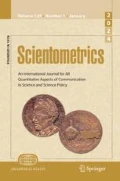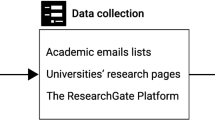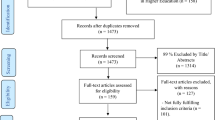Abstract
Fifty Brazilian scientists working in life sciences were interviewed in order to explore reasons of bursts and falls in their scientific productivity. Scientists recognize specific periods of time of their career during which they are more productive. Bursts of productivity are influenced mainly by human relationships and, to a lower extent, by material conditions (equipment, grants, etc), time dedicated to work and reasons linked to the kind of work carried out. The most productive scientists tend to attribute more importance to human relations than their colleagues with lower productivity scores. Some possible reasons for this discrepancy are discussed.
Similar content being viewed by others
References
D. Grynspan, L. de Meis, The concept of creativity among biochemists,Biochemical Education, 18 (1990), 182–188.
D. Cole, Citation and the evaluation of individual scientists,TIBS, 14 (1989) 9–13.
R. Meneghini, L. Fonseca, Indices alternativos de avaliação cientifica em bioquímica no Brasil;Ciência e Cultura, 42 (9) (1990) 629–645.
L. de Meis, R. C. P. Machado, P. Lustosa, V. R. Soares, M. T. Caldeira, L. Fonseca, The stereotyped image of the scientist among students of, different countries: Evoking the alchemist?Biochemical Education, 21 (2) (1993) 75–81.
J. Leta, L. De Meis, A profile of science in Brazil,Scientometrics, 35 (1) (1996) 33–44.
L. R. Harmon, The development of a criterion of Scientific competence. in:Scientific Creativity: its Recognition and Development,C. W. Taylor,F. Barron (Eds). New York, Wiley, 1963, pp. 44–52.
G. Sonnert, What makes a good scientist?: Determinants of peer evaluation among biologists,Social Studies of Science, 25 (1995) 35–55.
H. A. Krebs, The making of a scientists,Nature, 215 (1967) 1441–1445.
R. K. Merton, The Mattew effect in science,Science, 159 (1968) 56–63.
W. M. Rossiter, The Mattilda effect in science,Social Studies of Science, 23 (1993) 325–341.
Z. Qin, D. W. Johnson, R. T. Johnson, Cooperative versus competitive efforts and problem solving.Review of Educational Research (1995) 129–143.
Author information
Authors and Affiliations
Corresponding author
Rights and permissions
About this article
Cite this article
Fonseca, L., Velloso, S., Wofchuk, S. et al. The importance of human relationships in scientific productivity. Scientometrics 39, 159–171 (1997). https://doi.org/10.1007/BF02457445
Received:
Issue Date:
DOI: https://doi.org/10.1007/BF02457445




